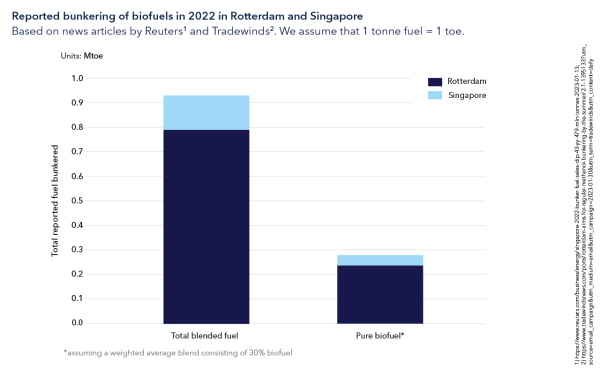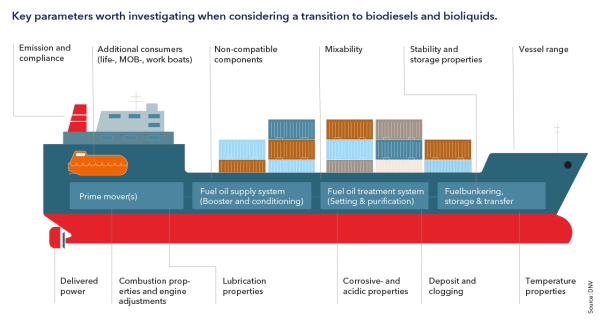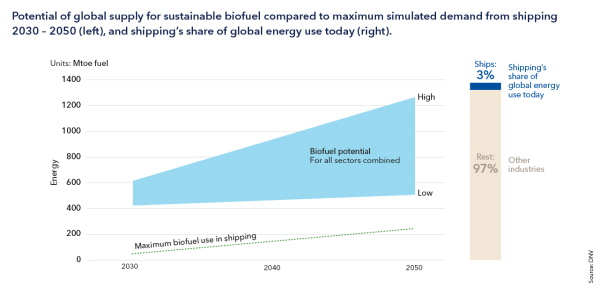With the maritime industry increasingly looking for ways to decarbonize, demand for biofuels is on the rise. Biofuels – in the form of methane, methanol or fuel oils – are seen as a convenient way for shipping companies to reduce their carbon emissions because of their ability to be used as a “drop-in” fuel.
This means that biofuels can be mixed with similar versions of fossil fuels and used to power existing engines. This is an extremely attractive decarbonization solution for shipowners as it negates the need for large-scale capital investments which are necessary for other decarbonization options, such as the retrofitting of engines to dual-fuel capability.
Biofuels in shipping today
Biofuel use in shipping has so far been extremely low. Before 2022, this was limited to a number of demonstrations, pilots and trials carried out onboard ships. However, in 2022, this seemingly accelerated with reports of around 930,000 tonnes of blended biofuel being bunkered in Singapore and Rotterdam.
“Blended biofuels typically consist of around 30% biofuel so we concluded that these figures from Singapore and Rotterdam accounted for around 280,000 tonnes of pure biofuels,” says Eirik Ovrum, Principal Consultant in DNV Environment Advisory and co-author of the biofuels white paper. “Whilst this might seem like a large number, it still accounts for just 0.1% of total maritime fuel consumption of 280 million tonnes of oil equivalent (Mtoe) per year.”
Practical considerations for use of biofuels onboard
Although biofuels are regarded as relatively easy and straightforward to use, they still have the potential to damage equipment onboard a vessel if not dealt with correctly. Due to the lack of long-lasting trials, there is a shortage of experience with regard to biodiesels and bioliquids and their compatibility with existing onboard machinery. Therefore, it is important to evaluate biofuels on a case-by-case basis to make sure that the fuel specification and quality is compatible with the intended applications onboard the vessel.
With this in mind, the white paper stresses the need for several practical considerations to be taken before biofuels are adopted by shipowners.
“All biofuel options should be mapped so that users are aware of their properties, such as what feedstock they are based on, how they are produced and what their ideal storage conditions are,” says Ovrum. “Dialogue should be held with engine manufacturers and equipment suppliers to make sure that there are no compatibility issues with certain biofuels. Seafarers and other personnel should be provided with relevant training related to the application of biofuels.”
Are biofuels sustainable?
Biofuels are made by converting organic matter, also known as biomass, into a fuel product. Biomass absorbs CO2 from the atmosphere during growth, which gives biofuels the potential to be carbon-neutral, even though CO2 is emitted when combusting most biofuels. The sustainability of biofuels is dependent on the feedstock. Biomass sourced from agricultural main products is usually referred to as conventional and not sustainable. Biomass from non-food or non-feed sources is termed advanced and has the potential to be regarded as sustainable, depending on the criteria.
“The EU Renewable Energy Directive (RED II) applies strict guidelines for which biofuels can be considered sustainable,” says Ovrum. “This is largely confined to the use of waste biomass as feedstock and we used this strict criteria when calculating the potential supply of sustainable biomass which can be used in shipping.”
Current supply of biofuels
DNV’s white paper assesses the current and future global biofuel production capacity by drawing on its own database of biofuel plants currently in operation, as well as visible planned biofuel production projects. This draws on a range of different public sources and databases and provides one of the most comprehensive overviews of biofuel production available. The database identifies around 5,000 biofuel production facilities worldwide and predicts how biofuel production is expected to develop through to 2050.

According to the paper, global production of advanced biofuels stands at 11 Mtoe per annum in 2023. A significant number of projects involving production from advanced biomass sources are expected to come on-stream between now and 2026, bringing total sustainable biofuel production levels up to 23 Mtoe per annum. Whilst this represents strong growth, it still falls short of the volume of biofuels that shipping would need in order to make a big impact on decarbonization efforts.
How much of the biofuel supply can shipping obtain?
If shipping was to decarbonize fully by 2050 primarily using biofuels, in combination with energy efficiency measures, 250 Mtoe per annum of biofuels would be required. DNV’s white paper estimates that the global sustainable and economical supply of biofuels could reach 500–1,300 Mtoe per year by 2050, which means that shipping would need between 20% and 50% of this supply if it was to decarbonize primarily using biofuels. Total global energy demand today is around 10,500 Mtoe per year and shipping accounts for around 3% of this. It is, therefore, unlikely that shipping will be able to obtain such a high share of biofuels.

Shipping is considered a hard to abate sector and there are many in the industry who feel like it should be prioritized for biofuel supply over other sectors like road transport, due to the difficulties in, for example, electrifying the maritime fleet. Nonetheless, competition for supply will be fierce, particularly from sectors like aviation and road transport, which have already established a foothold in the biofuels market.
The future of biofuels and shipping
DNV’s white paper concludes that it is likely that biofuels will play an important role in shipping over the coming decades. However, limits to production capacity and competition from a range of other sectors mean that shipping cannot rely on biofuels as the only solution to reaching its decarbonization targets. The maritime industry will, therefore, have to continue to explore other options to reach net zero.

“We are already seeing progress in the uptake of biofuels in shipping and we predict significant growth in the years ahead,” says Eirik Ovrum. “However, biofuels are not a magic bullet and shipping needs to be multi-faceted in the ways in which it addresses decarbonization. This means combining biofuels with more energy efficiency measures as well as developing the infrastructure for other carbon-neutral fuels.”